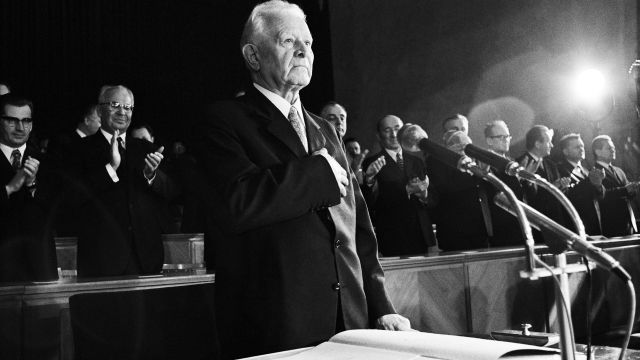You can also listen to the article in audio version.
President Miloš Zeman’s serious health problems raise questions about how far the head of state can carry out his duties after parliamentary elections. According to some politicians and constitutional lawyers, the time has come for both chambers of parliament to relieve it of its constitutional function.
A similar situation with an ailing president was dealt with once – under the communist regime in the 1970s.
In June 1972, the then president of Czechoslovakia Ludvík Svoboda suffered a stroke. It happened during a reception honoring Indian Prime Minister Indira Gandhi, who was arriving on a state visit.
The former general from World War II was 76 years old at the time and had spent four years at Prague Castle. After the collapse of the reception, additional health problems were added and Svoboda, after consulting with his family, decided that he no longer wished to continue for a second term.
However, leaders of the ruling Communist Party, led by General Secretary Gustav Husák, disagreed at first. They saw Svoboda as a person who still had the public’s trust and helped maintain the peaceful path of “normalization”, that is, the strengthening of the regime’s totalitarian nature, which followed the Soviet invasion of Czechoslovakia in August 1968.
Svoboda agreed and in March 1973 he was re-elected. However, the second period is characterized by protracted and gradually worsening problems from the very beginning. His unpreparedness was seen when he took the presidential oath. Instead of Svoboda, one of the vice-presidents of the federal parliament must read the text of the pledge.
“In late March 1974, he began urinary tract treatment at the State Sanatorium, but after being sent home to care, he suffered a series of pulmonary embolisms, bilateral pneumonia, and pleurisy,” explains historian Michal Macháček in his biography. Svobod’s successor, Gustáv Husák.
After heavy sedatives, Svoboda even fell into a coma. The doctors stated that the disease was incurable. The serious phase of negotiations for a new presidential election has begun.
Similar to Miloš Zeman’s case today, in the spring of 1974 people were speculating about what was really wrong with the president. There were rumors that Ludvík Svoboda was no longer alive and the leadership of the Communist Party of the Czech Republic hid his death so as not to disrupt May Day celebrations.
Then the regime responded by informing the public.
“The Management of the State Sanatorium and the Medical Council inform that, despite being in intensive care, the health condition of the President of the Republic, General of the Army Ludvík Svoboda, remains very serious. The permanent medical council permanently monitors all changes in the state of health and ensures the necessary treatment,” wrote on the page. front of the main party newspaper Rudé právo on April 30. The credibility of the information should probably be strengthened by a signed list of attending physicians listed below the text.
During treatment, Liberty is constitutionally represented by the federal government. Eventually, the president’s health improved enough to be sent home to care. By that time, however, it appeared to have been decided in the Communist Party leadership that he would not complete his second term as president.
Information about Ludvík Svoboda’s feelings about his next job at Castle is patchy.
According to the written memoirs of his daughter Zoe Klusáková-Svobodová, he wanted to resign, but the head of the Communist Party, Husák, refused to abdicate, citing the reason that people did not believe in the version of voluntary departure. Some historians, such as Jiří Pernes, claim instead that Svoboda was unwilling to give up the presidency.
This initiative was taken by the de facto most powerful man in the country, Gustáv Husák. He gradually made it clear that he would succeed Svoboda while remaining general secretary of the Central Committee of the Communist Party of the Czech Republic. Objections from his internal party opponents were silenced when such a collection of functions was endorsed by Soviet communist leader Leonid Brezhnev.
A decisive step was taken at a meeting of the innermost leadership of the Communist Party in May 1975. The participants were presented with a medical report, according to which Svoboda’s state of health did not allow him to carry out his duties properly, or to fulfill a normal life. conditions for abdication. Husák along with the Prime Minister of the Federal Government Lubomír Štrougal later reported to the others how Svoboda had not recognized them during the visit and was unable to hold a conversation.
However, in order for Gustav Husák to take over the presidency smoothly, the Constitution must be consulted. An amendment to the Constitutional Law on the Federation of Czechoslovakia, informally dubbed the Lex Svoboda, stipulated that if the president could not serve for more than one year, the Federal Assembly could elect a new president.
It is significant that Husák’s close associate, Deputy Prime Minister Karol Laco, was tasked with preparing the amendment. No doubt he tried a legally clean solution. However, according to later expert evaluations, the problem was that the amendments were retroactive. Even in non-freedom conditions, this goes against a basic constitutional principle.
However, at the time, no one had publicly questioned the arrangement. At the end of May 1975, Husák was elected as the new president.
Ludvík Svoboda, who lived just over four years after the end of his presidency, was held in high esteem until his death.
Husák, accompanied by Štrougal, visited the former president the day after his election. He was awarded the Czechoslovak Hero’s Gold Star. A tank division and a military college in Vyškov are named after Svoboda.
After his death in September 1979, the communists gave Svoboda a state funeral. Although initially Gustáv Husák did not want it, the funeral procession was carried out from Prague Castle. According to contemporary accounts, more than 300,000 people came to see the parade.

“Certified bacon geek. Evil social media fanatic. Music practitioner. Communicator.”







